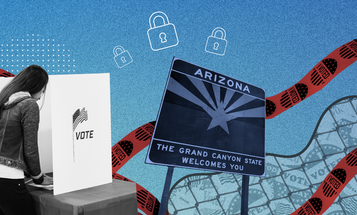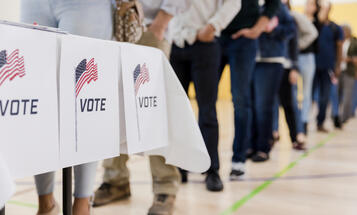
Ensuring Access to the Ballot for Americans with Disabilities
Today marks the 22nd anniversary of the Americans with Disabilities Act, a civil rights law protecting people with disabilities from discrimination in public spaces and work places, among others. In 2010, nearly 1 in 5, or 56.7 million, Americans had a disability, according to a report released by the Census Bureau yesterday. However, Americans with disabilities are still more likely to be unemployed, experience persistent poverty, and have lower levels of income and education.
While the ADA has had a positive impact on the quality of life for people with disabilities -- from improvements in access to public accommodations and public transportation, to increased understanding of disabilities by others -- there are still significant concerns regarding employment, healthcare and housing. The Census report shows that nearly 60 percent of people with disabilities age 21 to 64 were unemployed, compared with 21 percent of those with no disability. During the recent recession, employment among people with disabilities deteriorated five times as badly as did employment for the rest of American workers. While the non-disability workforce shrank by about 2 percent, for people with disabilities, the number working fell by over 10 percent. In 2010, the median earnings of people with disabilities were $10,000 lower than those reporting no disabilities.
But the unique interests and needs of this population are not being represented adequately for further progress. In 2008, people with disabilities were 7 percentage points less likely to vote than people without disabilities. In 2010, they were 3 percentage points less likely. According to one study, voters with disabilities were more likely to encounter a problem with their voter registration or with their voting machine, and were more likely to require help with voting.
In addition to the difficulties of voting, people with disabilities are less likely to be registered to vote than people without disabilities. In 2008, they were 5 percentage points less likely; in 2010, they were 1 percentage point less likely. And approximately 17-18 percent of the unregistered Americans with disabilities had either missed the registration deadline or were not sure how to register to vote.
Some states have adopted reforms that make voting and registration more accessible for Americans with disabilities like Same Day Registration, no excuse absentee voting, and vote-by-mail. But some states have also neglected a federal law that protects the voting rights of Americans with disabilities, specifically the National Voter Registration Act (NVRA) which requires state public assistance and disabilities agencies to provide voter registration services to clients. Earlier this year, the Disability Rights Network notified the state of Pennsylvania of its noncompliance and similarly, a group of non-profit organizations, including Demos, have filed a lawsuit against the state for not offering voter registration to low-income Pennsylvanians at public assistance agencies.
On this 22nd anniversary of the Americans with Disabilities Act, we should take a moment to celebrate the achievements but also examine and address the shortcomings. People with disabilities are a very diverse group – the type and severity of disabilities vary widely -- and it is important that their voices are heard and that their right to live in their communities with the services they need, free of discrimination, abuse and neglect is ensured.



